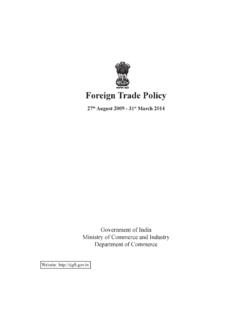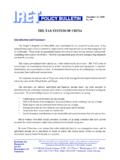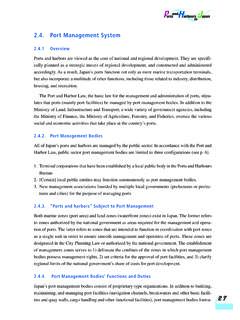Transcription of This document has been submitted to the Office of the ...
1 This document has been submitted to the Office of the Federal Register (OFR) for publication and is currently pending placement on public display at the OFR and publication in the Federal Register. The version of the proposed rule released today may vary slightly from the published document if minor editorial changes are made during the OFR review process. The document published in the Federal Register will be the official document . [4830-01-p] DEPARTMENT OF TREASURY Internal Revenue Service 26 CFR Part I [REG-115420-18] RIN 1545-BP03 Investing in Qualified Opportunity Funds AGENCY: Internal Revenue Service (IRS), Treasury. ACTION: Notice of proposed rulemaking and notice of public hearing. SUMMARY: This document contains proposed regulations that provide guidance under new section 1400Z-2 of the Internal Revenue Code (Code) relating to gains that may be deferred as a result of a taxpayer s investment in a qualified opportunity fund (QOF).
2 Specifically, the proposed regulations address the type of gains that may be deferred by investors, the time by which corresponding amounts must be invested in QOFs, and the manner in which investors may elect to defer specified gains. This document also contains proposed regulations applicable to QOFs, including rules for self-certification, valuation of QOF assets, and guidance on qualified opportunity zone businesses. The 2 proposed regulations affect QOFs and their investors. This document also provides notice of a public hearing on these proposed regulations. DATES: Written (including electronic) comments must be received by [INSERT DATE 60 DAYS AFTER DATE OF PUBLICATION OF THIS document IN THE FEDERAL REGISTER]. Outlines of topics to be discussed at the public hearing scheduled for January 10, 2019 at 10 must be received by [INSERT DATE 60 DAYS AFTER DATE OF PUBLICATION OF THIS document IN THE FEDERAL REGISTER].
3 ADDRESSES: Send submissions to: CC:PA:LPD:PR (REG-115420-18), room 5203, Internal Revenue Service, PO Box 7604, Ben Franklin Station, Washington, DC 20044. Submissions may be hand delivered Monday through Friday between the hours of 8 and 4 to CC:PA:LPD:PR (REG-115420-18), Courier s Desk, Internal Revenue Service, 1111 Constitution Avenue, NW., Washington, DC 20224. Alternatively, taxpayers may submit comments electronically via the Federal Rulemaking Portal at (IRS REG-115420-18). The public hearing will be held in the IRS auditorium, Internal Revenue Building, 1111 Constitution Avenue, NW, Washington, DC. FOR FURTHER INFORMATION CONTACT: Concerning the proposed regulations, Erika C. Reigle of the Office of Associate Chief Counsel (Income Tax and Accounting), (202) 317-7006 and Kyle C. Griffin of the Office of Associate Chief Counsel (Income Tax and Accounting), (202) 317-4718; concerning the submission of comments, the hearing, or to be placed on the building access list to attend the hearing, Regina L.
4 Johnson, (202) 317- 6901 (not toll-free numbers). 3 SUPPLEMENTARY INFORMATION: Background This document contains proposed regulations under section 1400Z-2 of the Code that amend the Income Tax Regulations (26 CFR Part 1). Section 13823 of the Tax Cuts and Jobs Act, Pub. L. No. 115-97, 131 Stat. 2054, 2184 (2017) (TCJA), amended the Code to add sections 1400Z-1 and 1400Z-2. Section 1400Z-1 provides procedural rules for designating qualified opportunity zones and related definitions. Section 1400Z-2 allows a taxpayer to elect to defer certain gains to the extent that corresponding amounts are timely invested in a QOF. Section 1400Z-2, in conjunction with section 1400Z-1, seeks to encourage economic growth and investment in designated distressed communities (qualified opportunity zones) by providing Federal income tax benefits to taxpayers who invest in businesses located within these zones.
5 Section 1400Z-2 provides two main tax incentives to encourage investment in qualified opportunity zones. First, it allows for the deferral of inclusion in gross income for certain gains to the extent that corresponding amounts are reinvested in a QOF. Second, it excludes from gross income the post-acquisition gains on investments in QOFs that are held for at least 10 years. As is more fully explained in the Explanation of Provisions, these proposed regulations describe and clarify the requirements that must be met by a taxpayer in order properly to defer the recognition of gains by investing in a QOF. In addition, the proposed regulations provide rules permitting a corporation or partnership to self-certify as a QOF. Finally, the proposed regulations provide initial proposed rules regarding 4 some of the requirements that must be met by a corporation or partnership in order to qualify as a QOF.
6 Contemporaneous with the issuance of these proposed regulations, the IRS is releasing a revenue ruling addressing the application to real property of the original use requirement in section 1400Z-2(d)(2)(D)(i)(II) and the substantial improvement requirement in section 1400Z-2(d)(2)(D)(i)(II) and 1400Z-2(d)(2)(D)(ii). In addition, these proposed regulations address the substantial-improvement requirement with respect to a purchased building located in a qualified opportunity zone. They provide that for purposes of this requirement, the basis attributable to land on which such a building sits is not taken into account in determining whether the building has been substantially improved. Excluding the basis of land from the amount that needs to be doubled under section 1400Z-2(d)(2)(D)(ii) for a building to be substantially improved facilitates repurposing vacant buildings in qualified opportunity zones.
7 Similarly, an absence of a requirement to increase the basis of land itself would address many of the comments that taxpayers have made regarding the need to facilitate repurposing vacant or otherwise unutilized land. In connection with soliciting comments on these proposed regulations the Department of the Treasury (Treasury Department) and the IRS are soliciting comments on all aspects of the definition of original use and substantial improvement. In particular, they are seeking comments on possible approaches to defining the original use requirement, for both real property and other tangible property. For example, what metrics would be appropriate for determining whether tangible property has original use in an opportunity zone? Should the use of tangible property be determined based 5 on its physical presence within an opportunity zone, or based on some other measure?
8 What if the tested tangible property is a vehicle or other movable tangible property that was previously used within the opportunity zone but acquired from a person outside the opportunity zone? Should some period of abandonment or under-utilization of tangible property erase the property s history of prior use in the opportunity zone? If so, should such a fallow period enable subsequent productive utilization of the tangible property to qualify as original use ? Should the rules appropriate for abandonment and underutilization of personal tangible property also apply to vacant real property that is productively utilized after some period? If so, what period of abandonment, underutilization, or vacancy would be consistent with the statute? In addition, comments are requested on whether any additional rules regarding the substantial improvement requirement for tangible property are warranted or would be useful.
9 The Treasury Department and the IRS are working on additional published guidance, including additional proposed regulations expected to be published in the near future. The Treasury Department and the IRS expect the forthcoming proposed regulations to incorporate the guidance contained in the revenue ruling to facilitate additional public comment. The forthcoming proposed regulations are expected to address other issues under section 1400Z-2 that are not addressed in these proposed regulations. Issues expected to be addressed include: the meaning of substantially all in each of the various places where it appears in section 1400Z-2; the transactions that may trigger the inclusion of gain that has been deferred under a section 1400Z-2(a) election; the reasonable period (see section 1400Z-2(e)(4)(B)) for a QOF to reinvest proceeds from the sale of qualifying assets without paying a penalty; administrative 6 rules applicable under section 1400Z-2(f) when a QOF fails to maintain the required 90 percent investment standard; and information-reporting requirements under section 1400Z-2.
10 The Treasury Department and the IRS welcome comments on what other additional issues should be addressed in forthcoming proposed regulations or guidance. Explanation of Provisions I. Deferring Tax on Capital Gains by Investing in Opportunity Zones A. Gains Eligible for Deferral The proposed regulations clarify that only capital gains are eligible for deferral under section 1400Z-2(a)(1). In setting forth the gains that are subject to deferral, the text of section 1400Z-2(a)(1) specifies gain from the sale to, or exchange with, an unrelated person of any property held by the taxpayer, to the extent that such gain does not exceed the aggregate amount invested by the taxpayer in a QOF during the 180-day period beginning on the date of the sale or exchange (emphasis added). The statutory text is silent as to whether Congress intended both ordinary and capital gains to be eligible for deferral under section 1400Z-2.















